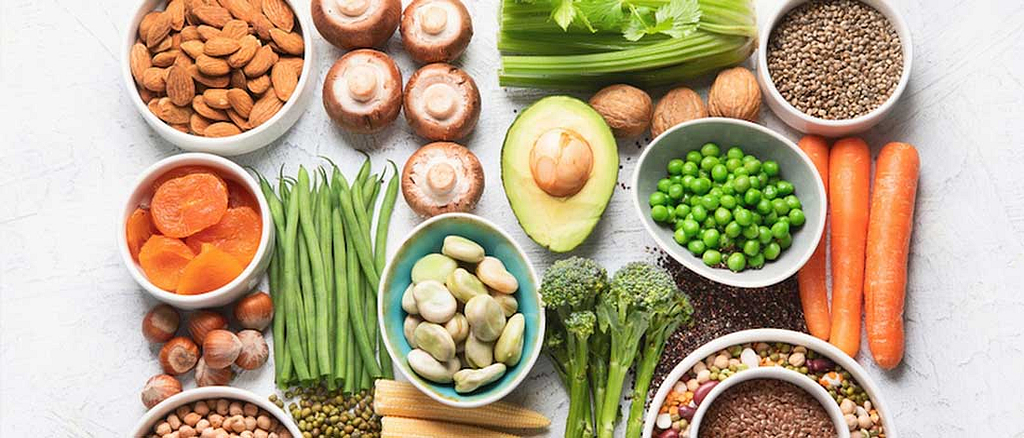“But where do you get your protein from?”, is the unfortunately ill-informed question most vegans get asked about their diet, especially down the gym.
Which is bizarre as some of the best vegan protein shakes on the market are plant-based and hemp protein, in particular, is quickly gaining a reputation for being a complete plant protein. If you’re looking to supplement your vegan or vegetarian diet with some extra protein to make gains down the gym then we already have some fantastic protein supplements that we’ve tried and tested and proved to work wonders.
But if you want to bolster your diet with whole foods and enrich your plate read on for a list of the best vegan protein sources.
Best Vegan Protein Sources
1. Seitan
Seitan is quickly gaining a reputation for being a dynamic and protein-rich meat supplement. It can be used in recipes that you know and love from before you adopted a plant-based diet and in most could barely tell the difference. It’s delicious taste and meaty texture allow it to work perfectly as a plant-based burger, or breaded with those secret spices that put even what Colonel Sanders has to offer to shame. At 75 grams of protein per 100g, it’s one of the most dense available, and low in carbs too. It is not friendly to those who are gluten intolerant though, it is made from wheat gluten, something to bear in mind.
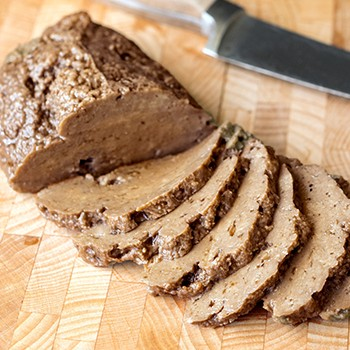
2. Tofu, Tempeh, and Edamame
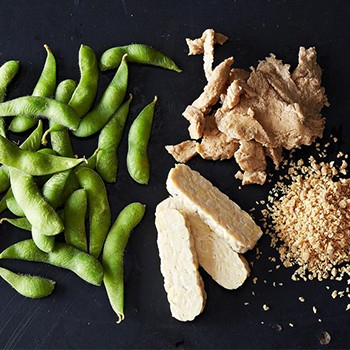
Tofu (see also ‘Is Tofu Vegan-Friendly Food?‘) has always been the vegetarian and vegans go-to with such high amounts of protein. (1) 100 calories worth of tofu offers 11g of protein, compared to ground beef which for the same caloric portion only offers 8.9g it’s easy to see why even the most carnivorous accept it as a healthier option.It’s not the best soybean product though and tempeh is quickly becoming even more popular due to a nicer more firm texture and more rounded flavor. Its less processed contains less fat, and is richer in protein than its predecessor too. Like tofu it goes great in Asian cuisine, but also works as a meat replacement in western recipes too.
The most popular edamame derivative is probably soy milk though which is a great dairy-free alternative to cows milk and great for vegans as it is often enriched and fortified with calcium and vitamin b12. It’s a great source of vegan protein.
3. Lentils
Gram for gram, lentils have more protein than beef and 23 times less saturated fat.
They are a delicious and versatile staple of the vegan diet and there are already tonnes of fantastic recipes for them from the less meat crazed cultures of the east. With a deep peppery taste they can easily be supplemented for rice or added into soups or stews the thicken it out and give it a bit more substance and bite.My personal favorite is a spiced lentil daal with red pepper, zucchini, and sprinkled with nutritional yeast (see also ‘10 Nutritional Yeast Substitutes‘) and seeds. It’s a protein power bowl that I enjoy on a weekly basis.
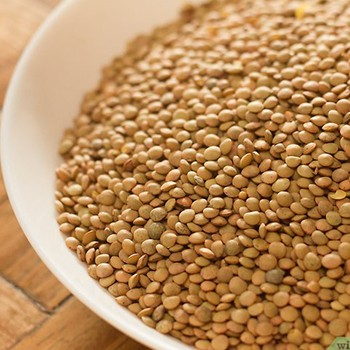
4. Chickpeas and Beans
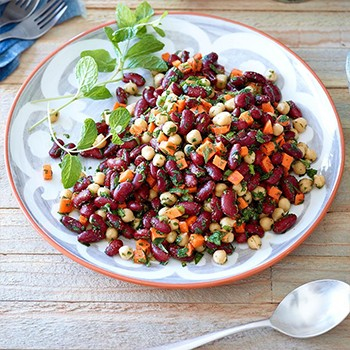
At 9.6g of protein per 100g of beans, it’s clear to see they’re packing their punch. Chickpeas (garbanzo beans), green peas, and kidney beans are amongst the most common and protein rich, but there are many beans to choose from all equally as good. (2)They’re also rich in b vitamins and fiber, supplementing them into your diet in place of red meats can significantly reduce your risk of cancer.A three bean salad, or tasty bean stew is our favorite way of working these luscious legumes into our meal plans.
Chickpeas are also commonly pureed and whipped into hummus which compliments almost anything else as a side dish (see also ‘ Vegan And Vegetarian Side Dishes for Everyone’ ).
5. Nutritional Yeast
Often hailed in recipe books as the vegan answer to Parmesan cheese, nutritional yeast whilst not particularly appetizing in name has a delicious nutty, cheesy flavor that makes it easy to season pastas, risottos, salads, baked goods, and anything else you can think of.
Nutritional yeast is a complete protein offering all 9 essential amino acids, it’s often fortified with vitamin b12, and a serving typically provides 9g of protein. It’s basically a vegan or vegetarian supplement (see also ‘Turkesterone: Explaining New Vegan Supplement In Town‘) which has a great taste as an added bonus.
Want some real cheese? Check out this list of the best vegan cheese.
Related Post: Is Yeast Vegan?
6. Hemp seed
Hemp seed like nutritional yeast is a complete protein, containing all 9 of the essential branch chain amino acids.This and the fact that gram for gram it offers the same protein amounts as beef or lamb are the major reasons behind it becoming one of the most popular proteins. It’s already a hotly tipped ingredient for protein shakes but you can introduce the raw product into your kitchen as well. The seed has none of the “groovy” qualities that the leaf is famous for and you needn’t worry about not passing any drugs tests at work.
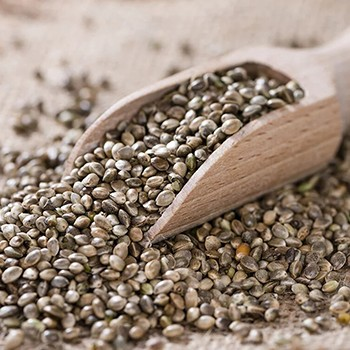
7. Spelt
Spelt otherwise known as hulled wheat or dinkel wheat is another great source of protein. Coming in at 15g of vegan-friendly protein per 100g of spelt it’s one of the most dense on the list. It’s rich in magnesium, a great source of fibre and full of healthy fats. If you think you need more magnesium, you can check out these magnesium supplements for vegans. There are some exciting recipes that make use of this fantastic ingredient and my personal favorite is a spelt and wild mushroom risotto. You can also bake it right into bread.
8. Chia Seeds

You might have noticed that seeds are scoring high on the protein tickbox, but different seeds are also very versatile in the other vitamins and minerals they provide. Chia seeds will give you 16.5g of protein per 100g, but on top of that for vegans they are an essential source of omega-3 fatty acids. (3)
Also rich in fiber, iron, and calcium, there are many reasons for you to add this seed into you diet.As with all seeds the best way to utilize them is to sprinkle them on cereals and salads, bake bread with them, or simply add them into your curry, soup, or any other hot dish.
9. Flax Seeds
Another seed with a wealth of benefits, the flax seed (linseed) is high in omega 3 fatty acids, and has been proven to help with digestive health, reduce cholesterol, and lower blood pressure.
At 18g of vegan protein per 100g of seed it’s also very high in protein.Flax seeds can be utilised as above or can also be blended or added into smoothies or shakes for a little healthy boost. They are also commonly taken as supplements and are often vegan friendly using plant-based capsules, be sure to check the label though.

10. Pumpkin Seeds

At 19g of protein per 100g of seeds pumpkin seeds are another fantastic protein source.
They contain both omega 3 and omega 6 fatty acids, making them a vegans best friend. They are also full of antioxidants and fiber a combination that means they have benefits for your heart and liver. I often keep some lightly toasted pumpkin seeds for a snack if I get a little peckish inbetween meals. You can season them to taste and they have a wicked little crunch that makes them feel a little naughty. Due to their larger size compared to other seeds they can also be cooked right into most recipes.
11. Spirulina
At 57g of protein for 100g of this amazing algae, it’s easy to see why it’s been touted as a super supplement and definitely amongst the best vegan protein sources. It’s rich in vitamins b1, b2, and b3, copper, iron, magnesium, potassium, and mangenese, it also has small amounts of almost every other nutrient. Spirulina (see also ‘What is Blue Spirulina and How Does it Benefit You?’) is an cyanobacteria (yummy) which grows in fresh and salt water. (4) The health benefits of adding this to your diet are wide and well-researched with NASA claiming it can and should be grown in space for its astronauts. It neither looks, smells, or tastes that appealing, and the best way I’ve found of getting it down is to blend it into a flavor packed fruit smoothie.
Read our article on the best spirulina supplements here.

12. Oats and Oatmeal

There is a reason that all Scottish boys are brought up eating their oatmeal (see also ‘Oatmeal Is Vegan‘) every morning, with 16.9g of protein per 100g of oats they’re sure to help you grow up big and strong. Also a great source of fiber and carbs, they are well balanced and one of the best source of protein from grains. A true breakfast of champions, oatmeal can certainly help you make some gains down the gym. Sprinkle in some dried fruit, nuts, and seeds and you have a delicious and nutritious way to start the day.
This is a personal favorite too! How about you? Let me know in the comments section.
13. Fruits and Vegetables
Watercress, alfafa sprouts, spinach, asparagus, brocolli; if it’s green, it’s got protein.
There’s a reason Popeye was chugging back cans of the good stuff in order to get that awesome pump. Not only are there tonnes of tasty veggies packed full of protein, but they’re going to be serving up tonnes of other nutrional benefits as well.Your diet as a vegan should always be rich in lots of fruit (see also ‘Can You Still Keep In Shape As A Fruitarian?‘) and vegetables but focus on the greens if you’re worried about getting enough vegan protein.

14. Nuts and Nut Butters

Nuts will give you a good 20g of protein per 100g serving, nut butters (see also our article on cocoa butter) increase that to 25g.
Peanuts, almonds, pistachios, cashews, and walnuts are all rich in protein and other nutrients as well as healthy fats. You can use them as a healthy snack, add them into cereals or even enjoy the sweet benefits by swigging back the range of nut milks now available. The milks are also often fortified with other nutrients like calcium or b12 making them a great addition to your smoothie or protein shake. My personal favorite nut based cooking is a cashew nut curry made with coconut milk and whichever spices most tickle your tastebuds.
15. Wild Rice
Seeings as rice is a solid addition to anything else you might rustle up in the kitchen finding some that is also providing you with your protein needs is a win win situation. Wild rices are not actually rice at all in the traditional sense but are a good stand in food on your plate. The grain was a firm favorite of the Native Americans and cooks the same as traditional rice but with a much stronger flavour and nutritional benefit.
Vegan Bodybuilders On Protein
With the rising popularity of adopting a plant-based diet, it should come as no surprise that there are more and more athletes, bodybuilders, and vegan strongmen making the switch. Their diets are typically a little less calorically dense so they have to make up for this in volume, but none seem to be struggling to get the necessary amount of protein.
Most non-vegan athletes I meet are confused at first and always have a tonne of questions. Many people are just uneducated about where vegans get their protein. When becoming vegan 13 years ago my stamina increased, my strength increased, I was able to build muscle faster, had more energy and my immune system was so much stronger.
Vanessa Espinoza,
Profressional Boxer, Bodybuilder And Personal Trainer
Strongman Patrik Baboumian as another great example, having won many powerlifting
(see powerlifting exercises) and strongman competitions around the globe ‘The Armenian Viking’ definitely has credible credentials when discussing the vegan diet and protein. Baboumians diet includes smoothies and shakes, but his meal plans also include whole foods like vegan sausages, falafel, grilled veggies, and tofu.
The only difference being a vegan athlete (see also ‘Mike Tyson Stops Being Vegan?‘) makes is in the kitchen it seems, not in the gym.
To be honest I was very anxious how switching to a plant-based diet would affect my performances before I went vegan. I had expected that everything would be very hard for me to get used to. It was much easier than I had anticipated.
Patrik Baboumian
Vegan Strongman
Do You Need To Take Protein Supplements On A Vegan Diet?
You don’t need to supplement protein on a vegan or vegetarian diet (see also ‘The Difference Between Vegan And Vegetarian Diets‘), as long as you are making sure to enrich your diet with alternative sources of protein.
Plant-based protein is a rich and varied alternative to animal products and even those bodybuilders who still consider themselves carnivores are switching to hemp, pea, and rice protein as it is a complete protein containing all of your 9 branch chain amino acids.
Here are some articles you might find useful:
Vegan Protein Sources: Our Final Thoughts

We’ve offered you heaps of delicious and nutritious ways in which vegans, no matter what vegan level you are, can easily work complex and complete vegan protein sources into their diet. You can do it with whole foods alone but if you’re looking for that extra push there are also plant-based protein powders available.By experimenting in the kitchen and making sure to focus on nutrient and protein dense sources you can up your protein quota and succeed in making your meal plans a little more diverse and nutrient rich at the same time, helping with weight loss and serving up powerful other health benefits.
References:
1. David L. Katz, MD, Why Tofu is an Excellent Alternative to Meat, (Chicken), retrieved from https://www.oprah.com/health/tofu-as-an-alternate-source-of-protein-nutrition-advice2. Natalie Butler, RD, LD, What are the benefits of chickpeas?, retrieved from https://www.medicalnewstoday.com/articles/280244.php3. Adda Bjarnadottir, MS, Chia Seeds 101: Nutrition Facts and Health Benefits, retrieved from https://www.healthline.com/nutrition/foods/chia-seeds4. UCMP, Introduction to the Cyanobacteria, retrieved from https://ucmp.berkeley.edu/bacteria/cyanointro.html
[tcb-script type=”application/ld+json”]{“@context”: “http://schema.org/”,”mainEntityOfPage”: “https://veganliftz.com/best-vegan-protein-sources/”,”@type”: “Article”,”headline”: “The Best High Protein Vegan Foods – 15 Healthy Plant-Based Options”“,”datePublished”: “2019-08-04″,”dateModified”: “2019-11-06″,”description”: “After doing some extensive research, I have discovered 15 of the best protein sources for vegans. I was shocked with the benefits of #12 because of its…”,”keywords”: [“best vegan protein sources”, “high protein vegan foods”, “vegan protein sources”],”image”: {“@type”: “ImageObject”,”height”: “379”,”width”: “725”,”url”: “https://mlbmbvodvbvn.i.optimole.com/w:auto/h:auto/q:100/f:best/https://veganliftz.com/wp-content/uploads/2019/08/Best-Vegan-Protein-Sources_Featured_image.jpg”},”author”: “Jason Hughes”,”publisher”: {“@type”: “Organization”,”name”: “Vegan Liftz”,”sameAs”:[“https://www.facebook.com/veganliftz/”,”https://twitter.com/veganliftz”,”https://www.pinterest.com/veganliftzofficial/”,”https://www.instagram.com/veganliftz/”,”https://www.youtube.com/channel/UCVilJCjZsaI1Q50fbM_IsnQ”,”https://goo.gl/maps/sC3u4cuyWLqYwhBY7″],”logo”: {“@type”: “ImageObject”,”url”: “https://mlbmbvodvbvn.i.optimole.com/w:auto/h:auto/q:100/f:best/https://veganliftz.com/wp-content/uploads/2019/04/Veganliftz_White_Small.png”}}}[/tcb-script]
- Why is My Poop Black: Uncovering the Causes and Solutions - December 21, 2023
- Clear Protein Drinks: Optimal Hydration and Muscle Support for Athletes and Fitness Enthusiasts - December 21, 2023
- Does Apple Juice Make You Poop: Uncovering the Digestive Effects - November 29, 2023

